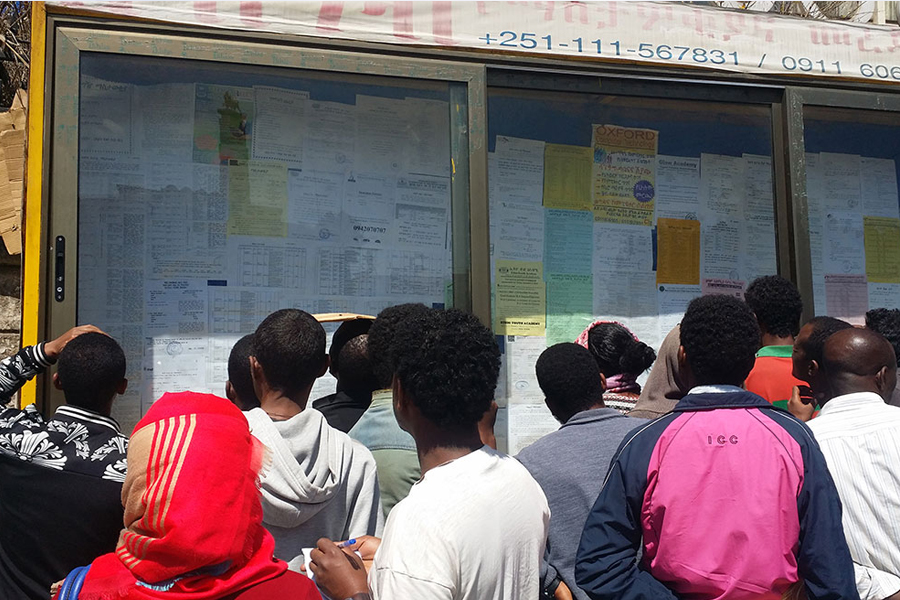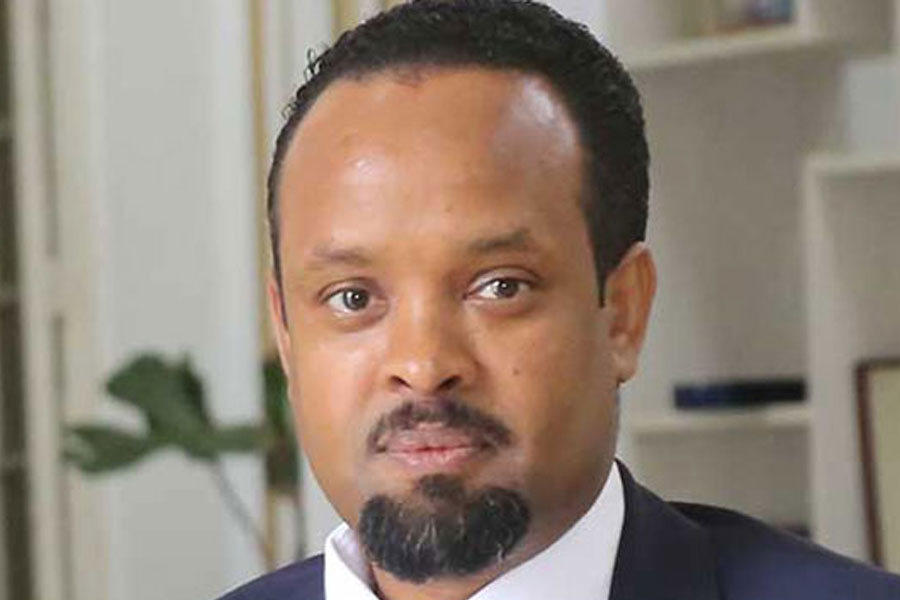
Radar | Nov 26,2022
Dec 23 , 2023
By Anne O. Krueger
In its latest World Economic Outlook, the International Monetary Fund (IMF) reported that a rising share of countries – 56pc of low-income countries and 25pc of emerging markets – are “in or at high levels of debt distress.” While some of these countries are already working on reform programs that will make them eligible for IMF funding and offer good prospects for economic growth, many are not. A developing-world debt crisis is looming.
Extremely high levels of indebtedness are usually preceded by a period during which creditors roll over claims or extend new loans with increasingly high interest rates. There is no simple way to determine when that debt becomes unsustainable. Analysts often use the debt-to-GDP ratio, but interest rates make a difference. Low-income countries facing concessional interest rates might have lower ratios than emerging-market economies, for which interest rates are higher.
The maturity structure of the debt also matters: if most of it will come due soon, the required rollovers (or renewals) will be much larger than for debts with a longer maturity.
Borrowing by poor countries is warranted if the loans finance activities that will yield a high rate of return for the borrower, whose own resources are already financing worthwhile activities. In such a scenario, debt service can be self-financing (barring unforeseen shocks). The problem is that, in many countries, sovereign borrowing has largely been to finance expenditures with low or negative rates of return, such as sports stadiums or pre-election handouts.
Such spending – together with large debts and fiscal deficits – can make lenders wary, leaving countries struggling to borrow, especially in times of rising interest rates. When creditors start refusing to roll over outstanding debt coming due, or when the interest rate that would be charged on new or rolled-over debt is prohibitive, a debt crisis erupts.
To many, the solution to developing-country debt distress seems obvious: Providing debt relief to countries that need it for debt-service payments can be reallocated toward expenditure on social services, such as health and education.
But experience shows that such reallocation is far from always guaranteed. When the debt of the world’s poorest countries was forgiven under the IMF-World Bank Heavily Indebted Poor Countries Initiative (HPIC), launched in 1996, adequate economic reforms did not follow. Again, many of these countries are highly indebted.
Debt relief is certainly needed. But to lend, even on soft terms, to governments that cannot or will not pursue sound, realistic, and business-friendly economic policies is simply to increase their future debt-servicing obligations. That is why debt relief must be conditioned on such reforms. It is not a new idea. From the mid-21 Century, when sovereign creditors formed the informal Paris Club grouping to find solutions to countries’ debt-servicing difficulties, they relied on the IMF to assess debtors’ economic prospects and determine the policy adjustments needed to improve economic performance.
The creditors recognised that, without reforms, debt would simply pile up again until another crisis erupted.
But some governments borrow so much that no reasonable policy adjustments would be sufficient to enable them to fulfil their debt-servicing obligations without imposing a “haircut” on creditors. In such cases, Paris Club members may allow for the rescheduling of debt service, thereby reducing the net present value of the debt to a sustainable level. Once such an agreement is reached, an IMF loan enables the country to resume imports while economic reforms take effect, leading to higher growth.
Obviously, most private-sector creditors also must agree to any restructuring; otherwise, the country would be left servicing debts to holdouts, reducing the amount available for those agreeing to restructure.
In the 1990s, changes were implemented that accelerated the resolution of debt problems, although delays were frequent and, for debtor countries, costly. But governments were increasingly borrowing from private sources by the end of the 20th Century. In 2010, low- and middle-income economies owed 46pc of their long-term public and publicly guaranteed external debt to private creditors. By 2021, that share had risen to 61pc.
Though the Paris Club’s share of debt declined, its procedures continued. When Turkey confronted debt-servicing difficulties in 2002, it undertook policy reforms and received an IMF loan, quickly restoring rapid GDP growth. Around the same time, Argentina became unable to meet its obligations, so its debt had to be restructured.
Today, however, another major sovereign creditor on the block – China – has refused to join the Paris Club. Other creditors are naturally reluctant to participate in debt restructuring if China does not, lest they end up effectively bankrolling full debt-service payments to China. Sri Lanka and Zambia have faced long delays in receiving debt relief because their Chinese creditors refuse to agree to the debt-restructuring terms agreed on in the Paris Club, even though the IMF had backed the associated economic reform programs.
Fortunately, neither country’s financial situation attracted headline news, and creditors did not withdraw lending from others. But some countries – including Egypt, Lebanon, Pakistan, Turkey, and many smaller economies – report high debt-to-exports and debt-service-to-GDP ratios. In Lebanon, external debt reached 603pc of exports and 381pc of gross national income in 2021.
If several of the larger emerging markets and low-income countries are simultaneously confronted with rising interest rates and an increasing reluctance by creditors to roll over their debts, a global debt crisis is likely to erupt. To avoid this scenario, the world needs an international agreement establishing procedures for supporting debt-distressed sovereigns, enabling the IMF to deliver loans faster. And all creditors must adhere to it.
PUBLISHED ON
Dec 23,2023 [ VOL
24 , NO
1234]


Radar | Nov 26,2022

Commentaries | Dec 16,2023

Commentaries | Jul 30,2022

Commentaries | Sep 11,2020

Agenda | Jul 22,2023

Fortune News | Feb 11,2023

Life Matters | May 11,2019

Commentaries | Mar 18,2023

Fortune News | May 20,2023

Viewpoints | Jun 28,2025

Photo Gallery | 173707 Views | May 06,2019

Photo Gallery | 163931 Views | Apr 26,2019

Photo Gallery | 153966 Views | Oct 06,2021

My Opinion | 136556 Views | Aug 14,2021
Editorial | Oct 11,2025

Dec 22 , 2024 . By TIZITA SHEWAFERAW
Charged with transforming colossal state-owned enterprises into modern and competitiv...

Aug 18 , 2024 . By AKSAH ITALO
Although predictable Yonas Zerihun's job in the ride-hailing service is not immune to...

Jul 28 , 2024 . By TIZITA SHEWAFERAW
Unhabitual, perhaps too many, Samuel Gebreyohannes, 38, used to occasionally enjoy a couple of beers at breakfast. However, he recently swit...

Jul 13 , 2024 . By AKSAH ITALO
Investors who rely on tractors, trucks, and field vehicles for commuting, transporting commodities, and f...

Oct 11 , 2025
Ladislas Farago, a roving Associated Press (AP) correspondent, arrived in Ethiopia in...

Oct 4 , 2025
Eyob Tekalegn (PhD) had been in the Governor's chair for only weeks when, on Septembe...

Sep 27 , 2025
Four years into an experiment with “shock therapy” in education, the national moo...

Sep 20 , 2025
Getachew Reda's return to the national stage was always going to stir attention. Once...

Oct 12 , 2025
Tomato prices in Addis Abeba have surged to unprecedented levels, with retail stands charging between 85 Br and 140 Br a kilo, nearly triple...

Oct 12 , 2025 . By BEZAWIT HULUAGER
A sweeping change in the vehicle licensing system has tilted the scales in favour of electric vehicle (EV...

Oct 12 , 2025 . By NAHOM AYELE
A simmering dispute between the legal profession and the federal government is nearing a breaking point,...

Oct 12 , 2025 . By NAHOM AYELE
A violent storm that ripped through the flower belt of Bishoftu (Debreziet), 45Km east of the capital, in...